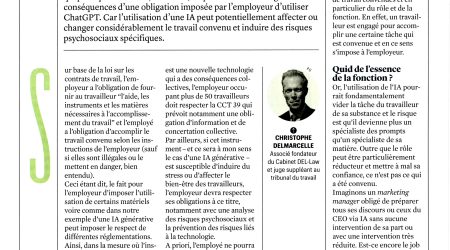Which terms and conditions of employment can be changed unilateraly by the employer?
Posted the 12 June 2020With the coronavirus crisis, all types of changes to working conditions have been made: workplaces, working hours, salaries, processes, roles – with some employees being 'reassigned' to other tasks... But can the employer unilaterally change these conditions?
In the context of Covid-19, working conditions have been modified like never before, except during wartime, and sometimes very substantially by employers. Of course, modifications resulting from mandatory provisions (mainly the ministerial decree of March 23, 2020, in its various iterations), such as mandatory telework in non-essential sectors, do not pose any issues. The same applies in cases where workers—generally willing in this regard—have accepted the proposed changes, such as those who could no longer work—or very little—and agreed to be reassigned to sectors or departments that were understaffed.
The situation regarding modifications imposed by an employer is more delicate, even in the current crisis context. The basis is that the employment contract is the law of the parties. In short, what is not contractual can be unilaterally modified, but what has been agreed upon between the parties cannot be changed without the consent of the other party.
Therefore, unless the employer has provided for the possibility of modifying an agreed-upon condition of employment through a clause, and that clause is valid (i.e., it does not concern an essential condition), the case law generally considers the workplace, salary, or function as essential, subject to special circumstances. The employer cannot unilaterally make changes to these conditions.
Telework Can No Longer Be Imposed
For example, since telework is no longer mandatory in non-essential sectors, employers are, in principle, required to have their employees work in the agreed locations, usually offices. They can no longer impose telework. However, if reasonable measures need to be taken in the offices (such as changing locations, separations, partitions, or, if necessary, individual measures like masks, hand sanitizer, etc.) to comply with mandatory social distancing, these will, in principle, be legal.
Reassigning personnel that involves drastic changes to the function and its content cannot, in principle, be imposed either. Moreover, such an order, if not accompanied by the necessary protective measures, could be illegal. Case law also recognizes the right to refuse such an order. Indeed, the employer must assess the risks and take all preventive measures. However, small changes due to business evolution should be acceptable, such as modifications to non-contractual elements (uncertain job content).
Reasonable changes to working hours (or location) can often be justified by the need to comply with social distancing measures, such as spreading out arrivals and departures in the company or reducing internal contacts (team work), etc.
What About Salary Conditions?
When it comes to changes to salary conditions, the exercise is tricky. When these modifications are due to economic changes (no bonuses because the figures are bad), it does not pose a problem in itself. However, salary reductions or the removal of benefits cannot be imposed. It is worth noting that changes to non-contractual conditions of certain benefits (hospital insurance, car, etc.) are, in principle, possible, as confirmed by the Brussels labor court.
The risk of an illegal modification is that the employer will have to adhere to the agreed conditions or provide compensation. At worst, the contract could be terminated (an act equivalent to termination or judicial resignation).
Thus, the principle remains that the contract binds the parties and must be respected. However, in the time of Covid-19, it is likely—if not desirable—that this principle will be applied more flexibly by all, particularly by the courts, leaving room for the employer's ius variandi (the right to change).
Related articles

Is an employer allowed to mandate the use of artificial intelligence tools by employees ? (Trends, 17-07-2025)

Caution if a former colleague opposed to your employer asks you to testify in their favor
